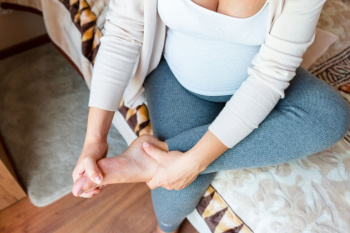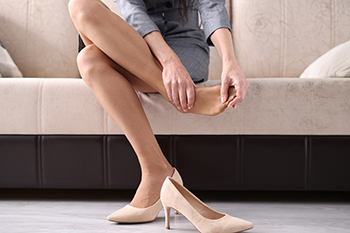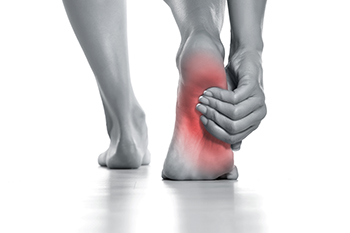Connect With Us
Blog
Items filtered by date: March 2024
Foot Pain and Plantar Pressure in Pregnancy

Pregnancy is a transformative journey for women, but it often comes with physical challenges, including changes in foot structure and increased plantar pressure. As the body undergoes hormonal shifts and weight gain, the arches of the feet may flatten, leading to heightened plantar pressure. This increased pressure can contribute to foot pain, discomfort, and conditions like plantar fasciitis. The body's natural response to the added weight and altered biomechanics can result in strained ligaments and muscles, worsening foot pain during pregnancy. Choosing supportive footwear, incorporating gentle exercises, and opting for custom orthotics can help alleviate plantar pressure and mitigate foot pain. Understanding the dynamic relationship between foot pain and plantar pressure is essential for expectant mothers to prioritize foot health during this unique and transformative period. Seeking guidance from a podiatrist can provide tailored strategies to manage foot discomfort, allowing pregnant women to navigate this remarkable journey with greater comfort and well-being. If you have any type of foot pain, it is suggested that you visit a podiatrist who can offer you additional relief tips.
Pregnant women with swollen feet can be treated with a variety of different methods that are readily available. For more information about other cures for swollen feet during pregnancy, consult with one of our podiatrists from New England Foot and Ankle. Our doctors will attend to all of your foot and ankle needs.
What Foot Problems Can Arise During Pregnancy?
One problem that can occur is overpronation, which occurs when the arch of the foot flattens and tends to roll inward. This can cause pain and discomfort in your heels while you’re walking or even just standing up, trying to support your baby.
Another problem is edema, or swelling in the extremities. This often affects the feet during pregnancy but tends to occur in the later stages.
How Can I Keep My Feet Healthy During Pregnancy?
- Wearing orthotics can provide extra support for the feet and help distribute weight evenly
- Minimize the amount of time spent walking barefoot
- Wear shoes with good arch support
- Wear shoes that allow for good circulation to the feet
- Elevate feet if you experience swelling
- Massage your feet
- Get regular, light exercise, such as walking, to promote blood circulation to the feet
If you have any questions please feel free to contact one of our offices located in Chelmsford and Newburyport, MA . We offer the newest diagnostic and treatment technologies for all your foot and ankle needs.
Heel Pain Can Be Treated!
Relieving Ball of Foot Pain From Wearing High Heels

High heels can add elegance and style to any outfit, but they often come with the uncomfortable side effect of pain in the ball of the foot. Fortunately, there are strategies to alleviate this discomfort and enjoy wearing heels more comfortably. This can begin by considering heels with a lower height or platform soles to reduce the pressure on the ball of the foot. Additionally, insert cushioned insoles or gel pads into your shoes to provide extra support and shock absorption. These inserts can help redistribute weight and alleviate pressure points, preventing pain and discomfort. Another helpful tip is to choose shoes with a wider toe box to allow more room for the toes and reduce crowding in the front of the shoe. Additionally, taking breaks from wearing heels throughout the day and stretching the feet and calf muscles can help relieve tension and prevent pain. If you enjoy wearing high heels and are experiencing pain in the ball of the foot, it is suggested that you consult a podiatrist who can provide you with additional relief tips.
High heels have a history of causing foot and ankle problems. If you have any concerns about your feet or ankles, contact one of our podiatrists from New England Foot and Ankle. Our doctors can provide the care you need to keep you pain-free and on your feet.
Effects of High Heels on the Feet
High heels are popular shoes among women because of their many styles and societal appeal. Despite this, high heels can still cause many health problems if worn too frequently.
Which Parts of My Body Will Be Affected by High Heels?
- Ankle Joints
- Achilles Tendon – May shorten and stiffen with prolonged wear
- Balls of the Feet
- Knees – Heels cause the knees to bend constantly, creating stress on them
- Back – They decrease the spine’s ability to absorb shock, which may lead to back pain. The vertebrae of the lower back may compress.
What Kinds of Foot Problems Can Develop from Wearing High Heels?
- Corns
- Calluses
- Hammertoe
- Bunions
- Morton’s Neuroma
- Plantar Fasciitis
How Can I Still Wear High Heels and Maintain Foot Health?
If you want to wear high heeled shoes, make sure that you are not wearing them every day, as this will help prevent long term physical problems. Try wearing thicker heels as opposed to stilettos to distribute weight more evenly across the feet. Always make sure you are wearing the proper shoes for the right occasion, such as sneakers for exercising. If you walk to work, try carrying your heels with you and changing into them once you arrive at work. Adding inserts to your heels can help cushion your feet and absorb shock. Full foot inserts or metatarsal pads are available.
If you have any questions please feel free to contact one of our offices located in Chelmsford and Newburyport, MA . We offer the newest diagnostic and treatment technologies for all your foot and ankle needs.
What Can Cause Heel Pain?

Heel pain, a common complaint among individuals of all ages, can significantly impact daily activities and quality of life. One common reason is plantar fasciitis, an inflammation of the thick band of tissue that runs across the bottom of the foot, often resulting from overuse or strain. Another prevalent cause is heel spurs, which are bony protrusions that develop on the underside of the heel bone due to repetitive stress or biomechanical issues. Achilles tendonitis, characterized by inflammation of the Achilles tendon at the back of the heel, is another frequent source of heel pain, often stemming from overuse or wearing improper footwear. Other factors contributing to heel pain can include stress fractures, arthritis, nerve irritation, and heel bursitis. Identifying the underlying cause of heel pain through thorough evaluation and diagnostic testing is vital for developing an appropriate treatment plan tailored to address the specific issue and alleviate discomfort effectively. If you have heel pain, it is strongly suggested that you are under the care of a podiatrist who can determine what the cause is, and guide you toward appropriate treatment options.
Many people suffer from bouts of heel pain. For more information, contact one of our podiatrists of New England Foot and Ankle. Our doctors can provide the care you need to keep you pain-free and on your feet.
Causes of Heel Pain
Heel pain is often associated with plantar fasciitis. The plantar fascia is a band of tissues that extends along the bottom of the foot. A rip or tear in this ligament can cause inflammation of the tissue.
Achilles tendonitis is another cause of heel pain. Inflammation of the Achilles tendon will cause pain from fractures and muscle tearing. Lack of flexibility is also another symptom.
Heel spurs are another cause of pain. When the tissues of the plantar fascia undergo a great deal of stress, it can lead to ligament separation from the heel bone, causing heel spurs.
Why Might Heel Pain Occur?
- Wearing ill-fitting shoes
- Wearing non-supportive shoes
- Weight change
- Excessive running
Treatments
Heel pain should be treated as soon as possible for immediate results. Keeping your feet in a stress-free environment will help. If you suffer from Achilles tendonitis or plantar fasciitis, applying ice will reduce the swelling. Stretching before an exercise like running will help the muscles. Using all these tips will help make heel pain a condition of the past.
If you have any questions please contact one of our offices located in Chelmsford and Newburyport, MA . We offer the newest diagnostic and treatment technologies for all your foot and ankle needs.
Ankle Sprains in Tennis Are a Common Court Injury

Ankle sprains can be a challenge for tennis enthusiasts, often a result of the fast-paced, lateral movements and abrupt stops inherent in the sport. The swift changes in direction, sudden pivots, and the need for explosive acceleration can place excessive strain on the ankle ligaments, making tennis players particularly susceptible to sprains. The lateral nature of the game, combined with the varying court surfaces, increases the risk of missteps and rolling the ankle. Symptoms of an ankle sprain include pain, swelling, bruising, and difficulty bearing weight on the affected foot. Timely and proper care is important for managing ankle sprains in tennis players. Care may consist rehabilitative exercises to regain strength and stability. Wearing supportive footwear and employing preventive strategies, such as ankle braces and adequate warm-ups, can help minimize the risk of ankle sprains and allow tennis enthusiasts to enjoy the game safely and sustainably. If you have sprained your ankle while playing tennis, it is suggested that you visit a podiatrist who can diagnose and treat this type of injury.
Ankle and foot injuries are common among athletes and in many sports. They can be caused by several problems and may be potentially serious. If you are feeling pain or think you were injured in a sporting event or when exercising, consult with one of our podiatrists from New England Foot and Ankle. Our doctors will assess your condition and provide you with quality foot and ankle treatment.
Common Injuries
The most common injuries that occur in sporting activities include:
- Achilles Tendonitis
- Achilles Tendon Rupture
- Ankle Sprains
- Broken Foot
- Plantar Fasciitis
- Stress Fractures
- Turf Toe
Symptoms
Symptoms vary depending upon the injury and in some cases, there may be no symptoms at all. However, in most cases, some form of symptom is experienced. Pain, aching, burning, bruising, tenderness, tightness or stiffness, sensation loss, difficulty moving, and swelling are the most common symptoms.
Treatment
Just as symptoms vary depending upon the injury, so do treatment options. A common treatment method is known as the RICE method. This method involves rest, applying ice, compression and elevating the afflicted foot or ankle. If the injury appears to be more serious, surgery might be required, such as arthroscopic or reconstructive surgery. Lastly, rehabilitation or therapy might be needed to gain full functionality in the afflicted area. Any discomfort experienced by an athlete must be evaluated by a licensed, reputable medical professional.
If you have any questions, please feel free to contact one of our offices located in Chelmsford and Newburyport, MA . We offer the newest diagnostic and treatment technologies for all your foot care needs.
Reminder: When Was the Last Time...?
Blog Archives
- March 2025
- February 2025
- January 2025
- December 2024
- November 2024
- October 2024
- September 2024
- August 2024
- July 2024
- June 2024
- May 2024
- April 2024
- March 2024
- February 2024
- January 2024
- December 2023
- November 2023
- October 2023
- September 2023
- August 2023
- July 2023
- June 2023
- May 2023
- April 2023
- March 2023
- February 2023
- January 2023
- December 2022
- November 2022
- October 2022
- September 2022
- August 2022
- July 2022
- June 2022
- May 2022
- April 2022
- March 2022
- February 2022
- January 2022
- December 2021
- November 2021
- October 2021
- September 2021
- August 2021
- July 2021
- June 2021
- May 2021
- April 2021
- March 2021
- February 2021
- January 2021
- December 2020
- November 2020
- October 2020
- September 2020
- August 2020
- July 2020
- June 2020
- May 2020
- April 2020
- March 2020
- February 2020
- January 2020
- December 2019
- November 2019
- October 2019
- September 2019
- August 2019
- July 2019
- June 2019
- May 2019
- April 2019
- March 2019
- February 2019
- January 2019
- December 2018
- November 2018
- October 2018
- September 2018
- August 2018
- July 2018
- June 2018
- May 2018
- April 2018
- March 2018
- February 2018
- January 2018
- December 2017
- November 2017
- October 2017
- September 2017
- August 2017
- July 2017
- June 2017
- May 2017
- April 2017
- March 2017
- February 2017
- March 2016


